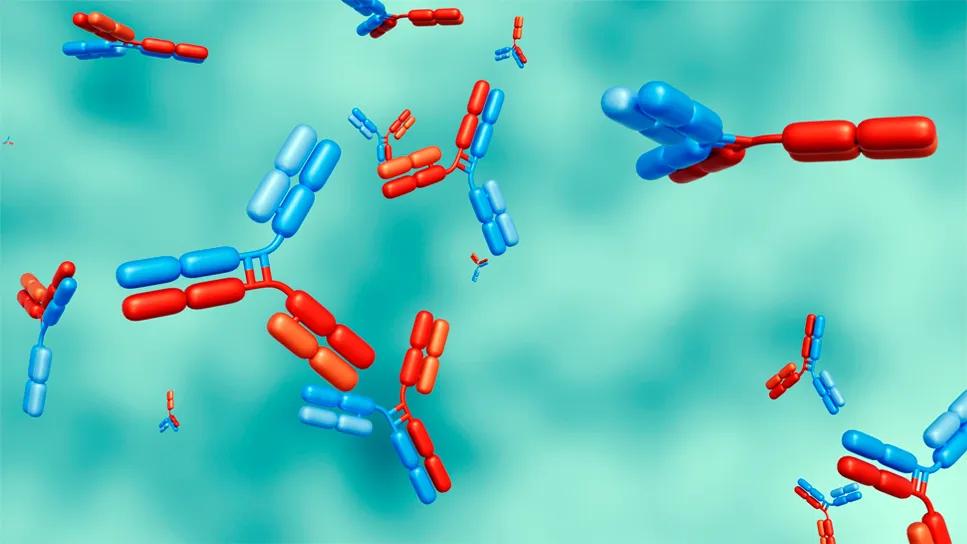Daratumumab is effective and safe

Light-chain (AL) amyloidosis is characterized by misfolded lambda or kappa light chain proteins that deposit amyloid fibrils into organs. As the amyloid fibrils accumulate, the affected organs may fail, and patients can experience issues like kidney dysfunction or heart failure.
Advertisement
Cleveland Clinic is a non-profit academic medical center. Advertising on our site helps support our mission. We do not endorse non-Cleveland Clinic products or services. Policy
Multiple myeloma (MM) and amyloidosis share similar characteristics, so physicians often try MM treatments for patients with amyloidosis. The standard treatment for amyloid patients is the use of combination chemotherapy and/or autologous stem cell transplant (auto-SCT); however, many AL amyloidosis patients are not candidates for auto-SCT due to their age and comorbidities, which potentially increase the chances of relapse.
If relapse occurs, “there is no defined set regimen that can be used,” as a next step, says Faiz Anwer, MD, Hematology and Medical Oncology. “At times, patients have to be treated multiple times for recurrent relapses. And once the disease relapses, there are many options available, some have unique advantages and some have unique disadvantages.”
Dr. Anwer recently conducted a retrospective study in an effort to determine the most effective treatment options for patients who have failed many prior therapies. He and his co-authors looked at published clinical trials using an antibody called daratumumab, already approved for MM, which binds to the protein CD38 expressed on the surface of plasma cells. By selective killing of plasma cells, this antibody reduces the production of abnormal amyloid proteins.
“In this particular analysis, there were patients with relapsed disease of varying ages,” says Dr. Anwer, who presented the study at the 2018 American Society of Hematology meeting. “But when we when looked at this group together, we realized all these patients were getting the single agent daratumumab and, in general, they were tolerating it well, and it had a good efficacy.”
Advertisement
The study included 129 patients whose ages ranged from 43 to 83 years old. Many had organ damage, 89 (69 percent) had cardiac involvement, and 64 (49.6 percent) had renal involvement. Of the prior therapies patients received, 106 (82 percent) received proteasome inhibitor-based therapy (bortezomib), and 69 (53.5 percent) received immunomodulatory-based therapy (lenalidomide). Another 41 (32 percent) received high dose melphalan (HDM) followed by auto-SCT.
The time from diagnosis of AL amyloidosis to the start of daratumumab varied from 7 to 150 months. A total of 114 patients (88 percent) received a daratumumab dose of 16 mg/kg weekly for eight weeks followed by every two weeks for the next eight weeks.
The treatment with daratumamab resulted in an impressive overall response rate of 72 percent (N = 75) with complete remission in 15 (14 percent) patients, very good partial response in 44 (42 percent) and a partial response in 16 (15 percent) patients.
In addition, 34 patients with cardiac involvement and 26 patients with renal amyloidosis were assessed for organ response across four studies. Thirteen patients (38 percent) with cardiac amyloidosis demonstrated an improvement in N-terminal pro-brain natriuretic peptide (NT-proBNP) levels. Ten patients (38 percent) with renal involvement responded according to consensus criteria for organ response. Another two had improvement in serum creatinine levels.
The analysis showed that daratumumab is well-tolerated. Among the 129 patients treated with daratumumab for relapsed AL amyloidosis, 36 (32 percent) reported infusion-related reactions (IRR), but most side effects were mild (grade 1 to 2). Daratumumab infusion was well tolerated in patients with cardiac (N = 54) and renal involvement (N = 48). Only one patient needed adjustment in his diuretic dose, another one developed decompensated heart failure and one died due to progression of cardiac disease. Seven patients had worsening of their NT-proBNP levels. Similarly, no dose adjustments were required for patients with renal amyloidosis, and one patient tolerated daratumumab infusion at a GFR < 20 mL/min without any complications.
Advertisement
Dr. Anwer says the next step is to test the use of daratumamab in combination with other chemotherapies and in patients who are newly diagnosed. It may work even better in patients who have not been treated before, he says, especially if used in combination with other therapies.
“Our group is already participating in a multi-institutional clinical trial,” he says, “and collecting valuable data using this approach to treat new amyloidosis patients with daratumumab.”
Advertisement
Advertisement

Combining advanced imaging with targeted therapy in prostate cancer and neuroendocrine tumors

Early results show strong clinical benefit rates

The shifting role of cell therapy and steroids in the relapsed/refractory setting

Radiation therapy helped shrink hand nodules and improve functionality

Standard of care is linked to better outcomes, but disease recurrence and other risk factors often drive alternative approaches

Phase 1 study demonstrates immune response in three quarters of patients with triple-negative breast cancer

Multidisciplinary teams bring pathological and clinical expertise

Genetic variants exist irrespective of family history or other contributing factors